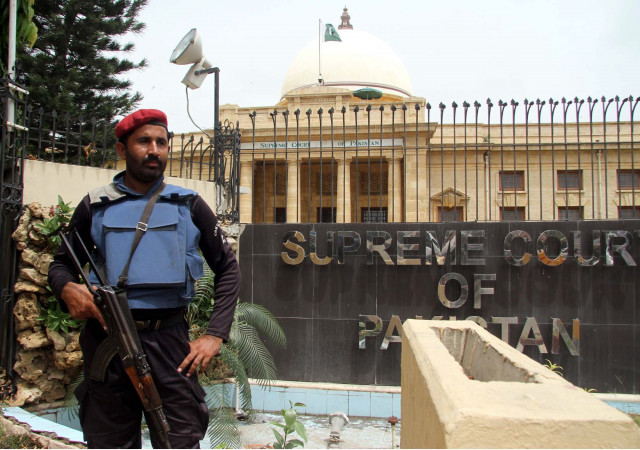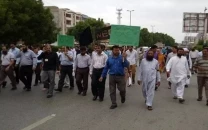Criminal justice system: ‘Conviction rate low as judicial system in need of reform’
Justice (retd) Rehmat Hussain Jaffery divides judicial system into three components

Justice (retd) Rehmat Hussain Jaffery divides judicial system into three components. PHOTO: PPI
Justice (retd) Jaffery was addressing a conference on criminal justice system at the Citizens-Police Liaison Committee office in Governor House. According to him, most of the judicial magistrates in the system did not even know how to record the statement of an accused, complainant or witness.
He explained the judicial system by fragmenting it into three components: the complainant, the accused and the police. Talking about the complainant, he was of the view that the system treats it as its stepchild as he/she is only allowed to file an appeal. For further action, a plaintiff must hire an attorney, he said.

Commenting on the second component, he said that the accused is, nevertheless, the blue-eyed boy of the system as he enjoys almost all the facilities. If an accused is tortured in captivity, it can land the captors in trouble, he added.
The third component — the police — are the most powerful, said Jaffery. A court decides a case in light of the evidence collected by investigators, who are the police, he said. The court cannot award punishment on its own to anyone unless it has been proven via facts under Qanoon-e-Shahadat, he said.
Elaborating more on the shortcomings in the system, he mentioned the role of investigators who fail to produce witnesses in the court. He proposed adequate training for judges and investigators for betterment of the system.
Overhaul needed
The criminal justice system across the world was nearly the same with some differences, remarked Jaffery. However, in our country, it needed implementation with reforms such as updating of the training manual of the judges and conducting investigations along modern lines.
Lawyer Faisal Siddiqui, who spoke after Jaffery at the event, seconded his recommendations. However, he added that he did not see the overhaul of the system in the near future. He was of the view that in the current scenario, the authorities could only make a choice between the bad and the worst.

Siddiqui said that the only evidence police normally possess is the report of the joint investigation team (JIT). According to him, there lays a problem in holding the JIT report as evidence as it can be rejected on technical grounds.
The lawyer added that he does not see the will in political forces, at least on provincial level, for bringing about a change in the system. He said that civil society and retired bureaucracy can get involved in the process to help make the system better.
Prison reforms
Speaking on the occasion, prisons IG Nusrat Mangan said that there were over 25,000 inmates in 25 jails across the province, of which 80% were under trial — meaning that their cases were pending in the courts.
The programme manager of non-governmental organisation Legal Aid Office, barrister Haya Zahid, said that the prison staff was unaware of the theory of imprisonment — why someone was sentenced to a jail. They would just think of the premises as being watchmen, without extending any affection towards the people punished for crimes or helping change them.
Police reforms
Former Sindh IG Shoaib Suddle said that for improvement in the criminal justice system, improvement in the police manual for investigations along modern lines was needed. He advocated the system of empowering the police chief in induction of officers and constables in the agency.
Published in The Express Tribune, July 16th, 2016.



















COMMENTS
Comments are moderated and generally will be posted if they are on-topic and not abusive.
For more information, please see our Comments FAQ